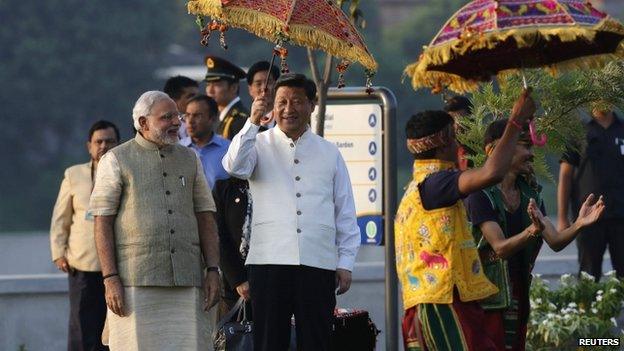China media: Xi's India visit
- Published

Mr Xi (left) wore a traditional Indian jacket gifted to him by Mr Modi (right) on Wednesday
Media urge the people of China and India to understand each other better as the leaders of the two Asian giants seek closer ties.
Chinese President Xi Jinping started his official visit to India in the western city of Ahmedabad on Wednesday.
Indian PM Narendra Modi welcomed the Chinese leader in his home city, breaking away from the tradition of receiving foreign leaders in Delhi.
Mr Modi gave the Chinese president a personal tour of Indian freedom leader Mahatma Gandhi's house in Ahmadabad.
The two leaders also took a brief walk along the banks of the river Sabarmati in Ahmedabad.
According to the China Daily, external, the two sides signed several agreements on a partnership between China's Guangdong province and Gujarat state.
Describing the atmosphere of the meeting as "friendly", the report added that more economic documents were expected to be signed in Delhi on Thursday.
While several papers, external and experts, external continue to discuss the personal relationship between the two leaders and the economic benefits of closer bilateral ties, some media outlets urge people to change their perceptions about India.
The Global Times' Chinese edition, external notes that some Chinese citizens still believe India is "poor", while others "refer to it as a democracy".
"The former perception is a negative one, while the latter is filled with praise for India's society. But all these are extreme views," it says.
The editorial goes to great lengths to introduce the country's economic and social situation to the readers, shedding positive light on its growth potential after pointing out the problems faced by the South Asian country.
The papers says India follows the Western form of democracy, but it is still far from perfect.
However, it adds that "India's development is moving rapidly. It will rise up as an influential country in the region because it has huge growth potential and it is ambitious".
The daily suggests that China and India should learn from each other because both are facing similar issues like huge populations, a weak development foundation and lack of resources.
"As a start, the Chinese people should not look down on India. They should also not look at its political system with an ideological purpose," it says.
Misconceptions
An article in the China Net, external, a state-run news portal, notes that the Chinese and the Indians hold misconceptions about each other, but Mr Xi's trip has given an opportunity to the Chinese people to "rediscover the value of India".
"Many people show contempt when they talk about India. They view this neighbouring country as backward, messy, dirty and poor… For many Indians, either they fear and hate China because of a war in the past, or they are suspicious and jealous of the real development of China," says the website.
"The Indians should view China's development objectively, to observe and understand China with their own eyes, rather than continuing to crawl at the feet of the broken Western discourse about China," says the article.
It adds that "Chinese citizens have to adopt a balanced attitude and rediscover India's strategic value and development potential, while accurately evaluating its reform measures and viewing its democratic system rationally".
Elsewhere, several media outlets are closely following Thursday's Scottish referendum.
An article in the China Net, external comments that British PM David Cameron "underestimated" the influence of the pro-independence camp when he agreed to the referendum in 2012.
However, it speculates that the Scottish people will consider "economic factors" when it comes to their voting decision.
According to the China Daily, external, experts expect Chinese investment in the UK to dip in the short-term if Scotland gains independence.
Joseph Deng, director of Shanghai Ghrepower Green Energy Co Ltd's UK subsidiary, tells the daily that Chinese businesses in Scotland will no longer be able to receive subsidies from the UK government if the region breaks away.
BBC Monitoring reports and analyses news from TV, radio, web and print media around the world. For more reports from BBC Monitoring, click here. You can follow BBC Monitoring on Twitter, external and Facebook, external.